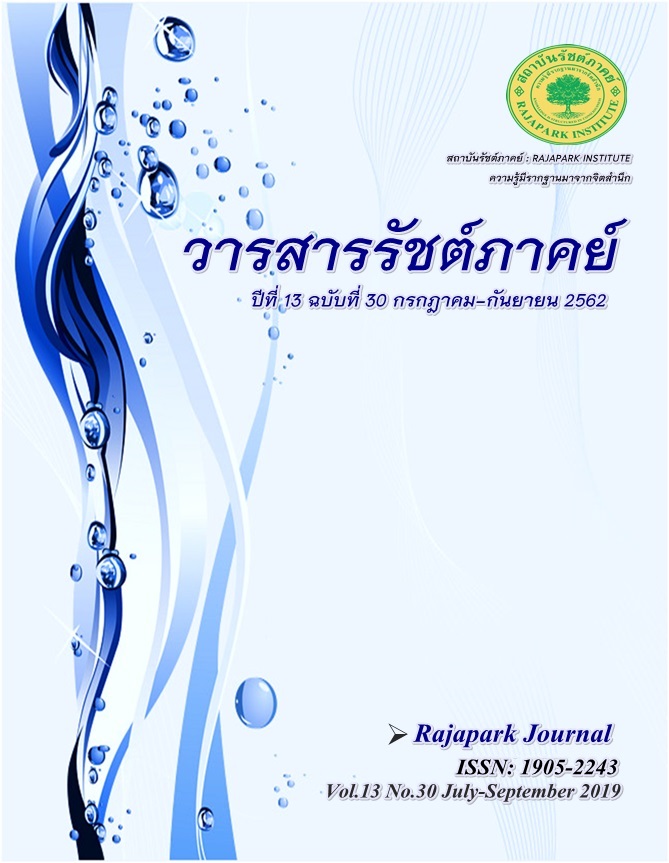Creation of Education Management Model in the Aviation Business for Thai Airways International Company Limited
Main Article Content
Abstract
Purposes of this retrieved were to study academic administrative guideline in aviation business and other business which provide specific academic courses for their organizations, to create and to evaluate Thai Airways International Public Company Limited’s academic administrative model. The samples were the persons who concerned with education from Panyapiwat Institute of Management, Civil Aviation Training Center and Royal Thai Survey Department for 10 personnel from each institutes by individual interview, including 11 expert in academic administration in aviation business from Thai Airways International Public Company Limited by using mixed format evaluation with consist of check list and open-ended questionnaires and analyzed by content analysis. The retrieved results found that Thai Airways International Public Company Limited could develop academic curriculum in aviation business for Bachelor degree in Business Aviation and Hotel and Tourism Management based on TQF: HEd. and following with standard criteria of International Civil Aviation Organization, International Air Transport Association and The Office for National Education Standards and Quality Assessment to provide instructional management which enhance both academic and experiential learning through actual practices.
Article Details

This work is licensed under a Creative Commons Attribution-NonCommercial-NoDerivatives 4.0 International License.
Views and opinions appearing in the Journal it is the responsibility of the author of the article, and does not constitute the view and responsibility of the editorial team.
References
Asghar, M., & Pilkington, R. (2018). The Relational Value of Professional Dialogue for Academics Pursuing HEA Fellowship. International Journal for Academic Development, 23(2), 135-146.
Boonyakiat, C. (2010). The Education preparation to step into the ASEAN community in 2015. Retrieved January 15, 2015, from http://www.chinnaworn.comindex.php?lay=show&ac=article&Id=539155790& Ntype=1,
Castellano, M. E., Richardson, G. B., Sundell, K., & Stone, J. R. (2017). Preparing Students for College and Career in the United States: The Effects of Career-Themed Programs of Study on High School Performance. Vocations and Learning, 10(1), 47-70.
Civil Aviation Training Center, Thailand. (2017). National Aeronautical Congress of Thailand. Retrieved December 17, 2017, from https://www.conferenceinthai.com/eventdetail/1746
Good, C. V. (1973). Dictionary of Education. (3rd ed.). New York: McGraw–Hill.
Guthrie, J. W. (1986). School Based Management: The Next Needed Education Reform. Phi Deta Kappan, 68(4), 305-309.
Hirsch, I. (1994). Countertransference Love and Theoretical Model. Psychoanal, Dial., 4(1), 171-192.
Kaewdang, R. (2003). School of Jurisprudence. Bangkok: Wattana Panich.
Keeves, J. P. (1988). Model and Model Building. U.K.: Pergamon Press.
Manarangsan, S. (2016). Work-based education. Retrieved September 1, 2016, from https://www.pim.ac.th/th/news/446/pim-work-based-education.html
Mutereko, S. (2018). Analyzing the Accreditation of Engineering Education in South Africa through Foucault's Panopticon and Governmentality Lenses. Assessment & Evaluation in Higher Education, 43(2), 235-247.
Office of Education Council. (2003). School-based management. Bangkok: Prigwhan Company Limited.
Prevost, L. B., Vergara, C. E., Urban-Lurain, M., & Campa, H. (2018). Evaluation of a High-Engagement Teaching Program for STEM Graduate Students: Outcomes of the Future Academic Scholars in Teaching (FAST) Fellowship Program. Innovative Higher Education, 43(1), 41-55.
Rajakulchai, S. (2000). Administrative planning and Control. (2nd ed.). Bangkok: CU Printing House.


